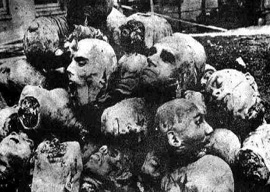
December 26, 2011

Armenian Genocide
THE FRENCH OCCUPATION OF ALGERIA
A notorious early literal holocaust occurred in 1844 when French soldiers herded Algerians into caves and created “smoking parlors” by setting fire to the entrances, giving the victims the choice of perishing via smoke inhalation or being burned to death. Within decades after the French occupation began, the native Algerian population shrank by nearly half.
On May 8, 1945—the day the Nazis surrendered—the French brutally suppressed an Algerian nationalist uprising in what became known as the Sétif Massacre. In keeping with the general pattern, the French claimed there were only 1,020 Algerian victims, while Algerians insist the death toll was closer to 45,000.
Until Algeria finally won independence in 1962, tactics in France’s “dirty war” were said to include cramming Algerians into concentration camps, dumping live Algerians into the sea via helicopters, torture by electric shock, sleep deprivation, truth serums, burying old men alive, and sodomy with glass objects. During a 1961 Algerian protest in Paris, the gendarmerie were said to have murdered up to 200 Algerians, whose bodies kept inconveniently washing up along the Seine’s banks.
The French government has not formally admitted to any of this and has routinely censored publications that dare to raise the subject—all while demanding penitence from Turks whose actions in World War I didn’t affect them in the least.
What to make of all this guilt-denial and guilt-projection, and why does it always seem to follow the same depressing patterns?
In pragmatic terms, denying historical guilt allows a nation to avoid costly civil claims from violating international humanitarian law. But in terms of national mythology, no group can seem to remain cohesive unless they perpetuate an unassailable narrative of collective honor coupled with its enemies’ moral degeneracy. Nearly all of politics consists of justifying one’s own side while infecting the enemy with guilt germs.
The twisted moral lesson is that it’s never genocide when we do it. Evolutionary group psychology hopelessly colors the way a tribe views history. This is why the descendants of Aztecs and Bantus who now scream for reparations regarding European colonialism would have you believe—despite all evidence—that they were humble, peaceful peoples before Paleface arrived.
Tremendous political power lies in managing the narrative, assigning historical guilt, and dictating what constitutes genocide and what doesn’t. Apologies never bring back the dead, who are cynically utilized as Propaganda Corpses. Apologies only serve to hobble the apologizer. While projecting guilt onto the enemy always precedes their annihilation, instilling guilt in them can win a war without a shot being fired. Persuading a social group to swallow a Guilt Pill is a more powerful weapon than 1,000 atomic bombs.
After all, look at what it’s done to Western Civilization.